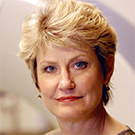RSNA 2018 RSNA/AAPM Symposium
Low-Dose CT: When Does it Matter, What are the Risks and How do we Make it Effective?


The RSNA/AAPM (American Association of Physicists in Medicine) Symposium, "Low-Dose CT: When Does it Matter, What are the Risks and How do we Make it Effective?" will be presented by Denise R. Aberle, MD, and Cynthia H. McCollough, PhD, on Tuesday, Nov. 27, at 10:30 a.m. in the Arie Crown Theater.
Denise R. Aberle, MD, will discuss the current role of low-dose CT in lung cancer screening and early detection, including current approaches to the classification of indeterminate lung nodules. Given the prominent role of semantic features in current diagnostic classification models of lung cancer, she will describe approaches to standardizing semantic characterization of lung nodules based on an illustrated lexicon in her presentation, “Contemporary CT of the Indeterminate Lung Nodule: Where We Are and Why it Matters.”
Dr. Aberle is professor of radiology and bioengineering at the University of California at Los Angeles (UCLA) and the vice chair for research at UCLA Radiological Sciences. Throughout her career, Dr. Aberle has focused on imaging informatics as well as the early detection of lung cancer and the role of imaging, clinical and molecular phenotypes in characterization and models of lung cancer.
Dr. Aberle was the principal investigator of the ACRIN-NLST (American College of Radiology Imaging Network component of the National Lung Screening Trial), the National Cancer Institute (NCI)-sponsored randomized trial that demonstrated the efficacy of low dose helical CT versus chest radiography for lung cancer screening and lung cancer mortality reduction. She is also director of the UCLA Lung Cancer Screening Program.
With an interest in oncologic imaging research, Dr. Aberle particularly works on the optimization of thoracic image acquisition techniques to characterize diffuse and focal lung diseases and establish imaging pipelines to improve the efficiency and performance of imaging biomarker capture. She also has been involved in the automated detection and characterization of CT-detected lung nodules, most notably for the early detection of lung cancer, characterizing the biological behavior of detected lung cancers, and in quantifying treatment response to oncology therapies. She and her team developed and validated the performance of a computer aided detection (CAD) method for detecting small nodules on thin-section CT. More recently, she has developed an illustrated atlas to improve the consistency of semantic terms in nodule characterization and to develop machine learning algorithms to characterize early lung cancer, combining machine learning with semantic imaging features.
Dr. Aberle is currently multi-principal investigator on a Research Project Grant (R01) from the National Institutes of Health for imaging biomarkers research for early lung cancer detection as well as grants within the NCI-sponsored Early Detection Research Network and the Consortium for Molecular and Cellular Characterization of Screen-Detected Lesions. She has previously been the program director/principal investigator on several other R01 and federally funded grants into the study and detection of lung cancer.
She is a former president of the Society of Thoracic Radiology and received its gold medal for outstanding lifetime achievement in 2015. She currently serves on the American College of Radiology’s (ACR) committee for LungRADS and co-chairs the ACR Committee for the Centers for Medicare and Medicaid Services Registry for Lung Cancer Screening. She has served on the RSNA Chest Education Exhibits Committee and her research has been published in Radiology and RadioGraphics.
Dr. Aberle began her career at UCLA after receiving her medical degree from the University of Kansas, Lawrence, completing a medicine residency at Boston University, MA, a radiology residency at UCLA, and fellowship training in thoracic imaging at the University of California San Francisco.
Cynthia H. McCollough, PhD, will discuss important considerations regarding the use of low-dose CT, including diagnostic performance of the radiologist, during her symposium presentation, “CT Technology and Dose in the 21st Century.”
A recognized leader in the development and evaluation of new CT technology and dose reduction methods, Dr. McCollough is the president-elect of the American Association of Physicists in Medicine (AAPM) and a professor of biomedical engineering and medical physics at Mayo Clinic College of Medicine and Science in Rochester, MN.
As the founder and director of Mayo Clinic’s CT Clinical Innovation Center, Dr. McCollough has contributed extensively to the field of dual-energy CT, including the non-invasive analysis of urinary stone composition, detection of gout, virtual mono-energetic imaging for enhancement of iodine signal and virtual non-contrast imaging. She is also a leader in the advancement of cardiac CT through the assessment and optimization of image quality and dose performance for both prototype and commercial systems.
Dr. McCollough is currently the principal investigator on several National Institutes (NIH) of Health-funded projects. In her sub-milliSievert CT U01 award, her team has assessed radiologist diagnostic performance for a range of clinical tasks as radiation dose is decreased, or for when iterative reconstruction is used. These data, and the validated observer models developed by Dr. McCollough and colleagues, can be used to efficiently optimize CT protocols for any scanner model.
In her bioengineering research partnership NIH Research Project Grant Program (R01), her team is collaborating with Siemens Healthcare to develop CT techniques capable of detecting changes in vasa vasorum density in carotid arterial walls — a sign of early atherosclerotic disease. As part of this project, they have demonstrated many clinical benefits from the research CT system at their center, which uses a new type of CT detector known as a photon counting detector.
As the former chair of CT physics at Mayo Clinic, Dr. McCollough oversaw the development and use of quantitative imaging in the lung, abdomen, heart and wrist. She was also the chair of the physics subcommittee of the American College of Radiology’s CT Accreditation Program, leading the development of the universally-recognized CT Quality Assurance Phantom and Physics Accreditation Program.
She is a member of the U.S. Food and Drug Administration’s Advisory Committee on Technical Electronic Product Radiation Safety Standards, a member of the U.S. National Advisory Council to the International Electrotechnical Commission, and has served as a board member of the National Council on Radiation Protection and Measurements.
Dr. McCollough received her master's and doctorate degrees in medical physics at the University of Wisconsin, Madison, after graduating summa cum laude with an undergraduate degree in physics from Hope College in Holland, MI.
Dr. McCollough currently serves as a member of the RSNA RadLex CT Committee. She previously served as third vice president of the RSNA Board of Directors, a member of the RSNA Scientific Program Physics Subcommittee, a member of the Radiology Editorial Board and as the AAPM board liaison to the RSNA Refresher Course Committee.
Web Extras
- Learn more about the RSNA 2018 plenary speakers at RSNA.org/Annual-Meeting